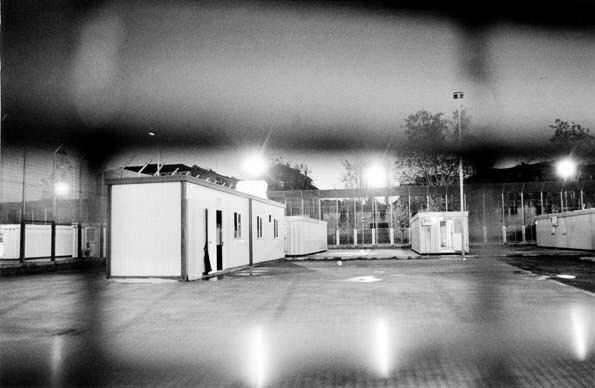The agreement provides for the concession by Albania of two state-owned areas for establishing three facilities under Italian jurisdiction in the port area of Shëngjin and in the city of Gjadër.
- One centre for entry procedures in Shengjin intended exclusively for health screening procedures, identification, and collection of asylum applications;
- One centre for the examination of applications for international protection, with a maximum capacity of 880 people in Gjader;
- One removal centre in Gjader with 144 places.
According to the Memorandum:
- Italy is responsible for maintaining security in the granted area and managing the facilities, expenses, and services. Italian law applies to the granted territory and Italian police personnel will be present;
- Albania is responsible for maintaining security in the external perimeter of the selected areas. Albanian authorities could enter the centres in emergencies.
MANAGEMENT AND COSTS
The management was entrusted through a negotiated procedure. The cooperative Medihospes was selected, offering a price almost 5% lower than the figure indicated by the Ministry of the Interior. Medihospes (formerly Senis Hospes) has been active in the reception sector for a long time and has been the subject of complaints of mismanagement in the past.
Medihospes is allocated 133 million euro for the total duration of four years, of which over 600 thousand euro for security management, almost 87 million euro for labour costs, and about 5.7 million euro for telephone cards. With the other total expenses (transport of persons in Albania, health care, salaries of Italian authorities and personnel, etc.) this comes to approximately 650 million, as included in the ratification law. In the preliminary market consultation that appeared on the police website at the end of May, additional costs emerged for chartering a private ship for a maximum of EUR 13,500,000 (excluding VAT). The duration of the services covered by the initial tender will be 90 days, starting in the second half of September 2024.
PEOPLE TO BE DETAINED IN ALBANIA
People rescued by the Italian authorities in international waters will be taken to the Shengjin hotspot, which will be considered a “border zone”. This status will allow the application of an “accelerated procedure” for the examination of asylum and international protection requests. Only people coming from a list of ‘safe countries’ will be detained in the facilities. In addition, under Article 28 bis Legislative Decree No. 25/2008, border procedures are to be excluded for vulnerable individuals, such as minors, pregnant women or people who have experienced physical or psychological violence. Thus, it is not clear how those conditions will be assessed, as the modalities of screening procedures are not defined by the protocol. Expenditure items in the tender documents show that the participants to the negotiated procedure are asked to provide services for minors and the rehabilitation of victims of torture or serious acts of violence.
FUNDAMENTAL RIGHTS AT STAKE
The agreement has raised significant concerns over potential human rights violations, particularly regarding legal defence and the right to asylum.
- Right of defence: hearings will be held entirely at a distance with the Court of Rome and lawyers will only be able to travel to Albania with a €500.00 reimbursement if the remote connection is not functioning. Moreover, it is not clear how an Italian defence counsel will be identified by migrants held in detention;
- Right of asylum: the competent authorities will be the Prefecture, the Questura, and the Territorial Commission of Rome. Those offices are notoriously already overburdened and will now be in charge of judging applications coming from Albania in the extremely compressed time (28 days) envisioned for accelerated procedures.
ACCESS AND MONITORING IN THE CENTRES
The Protocol only states that access in the centres will be allowed to lawyers, EU agencies, and international organisations assisting asylum seekers ‘within the limits provided by Italian, European and Albanian legislation’, but does not specify the modalities. In addition to the Italian Ombudsperson for persons deprived of their liberty, its Albanian counterpart would also seem to be competent. On 14 August, the UNHCR stated that although it was not a party to the negotiations, the Agency will have a monitoring role for an initial period of three months after which it will make its recommendations available to the government. The Agency’s position has raised several criticisms over the risk of legitimising the Agreement and encouraging the externalisation of asylum procedures by other countries of the global north.
The three planned centres in Albania were supposed to become active on 1 August. According to Giorgia Meloni’s plans, they should have opened before the European elections, but the date was postponed to the beginning of August, and then further postponed. In the meantime, the hotspot in the port city of Shëngjin seems to be ready, but since Italian Prime Minister Giorgia Meloni inaugurated it in June, journalists and civil society are forbidden access to the port.
The imminent opening of the centres in Albania shows how the government has overlooked the objections raised by human rights organisations, including CILD. With the implementation of the Italy-Albania Protocol, the fundamental rights of migrants who would be taken to facilities under Italian jurisdiction are put at risk. This experiment also sets a serious precedent that fuels the externalisation of detention and asylum claims.









